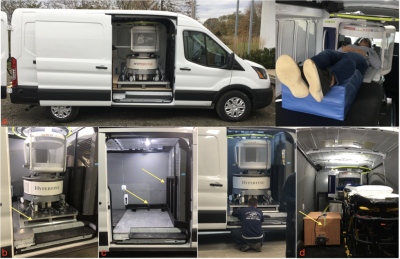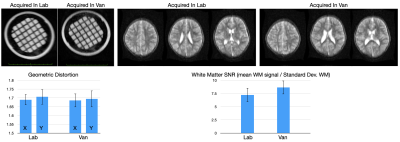Sean Deoni1, John Rogers2, Jennifer Beauchemin2, Viren D'Sa3, Eddy Boskamp4, Samantha By4, Chris McNulty4, William Mileski4, Brian Welch4, and Paul Medeiros5
1Bill & Melinda Gates Foundation, Seattle, WA, United States, 2Advanced Baby Imaging Lab, Rhode Island Hospital, Providence, RI, United States, 3Pediatrics, Rhode Island Hospital, Providence, RI, United States, 4Hyperfine, Guildford, CT, United States, 5New England Collision, Seekonk, MA, United States
1Bill & Melinda Gates Foundation, Seattle, WA, United States, 2Advanced Baby Imaging Lab, Rhode Island Hospital, Providence, RI, United States, 3Pediatrics, Rhode Island Hospital, Providence, RI, United States, 4Hyperfine, Guildford, CT, United States, 5New England Collision, Seekonk, MA, United States
With advancements in low field MRI increasing the potential for point-of-care imaging, we sought to determine the feasibility of at-home MRI for clinical and research applications. To this end, we customized a Ford Transit 'Scan-a-van' and demonstrated remote neuroimahging for the first time

Figure 1: (a) Customized Ford Transit “Scan-a-Van” with (b) aluminum pallet for loading and unloading the scanner. (c) A customized roll cage was built into the van and welded to the frame to provide a docking point for the scanner pallet and to secure the scanner in place while driving. The roll cage also increases driver safety, preventing the scanner from entering the driver compartment in the case of sudden stopping. (d) A shielded battery was also developed to provide >6 hrs of battery power when needed.
